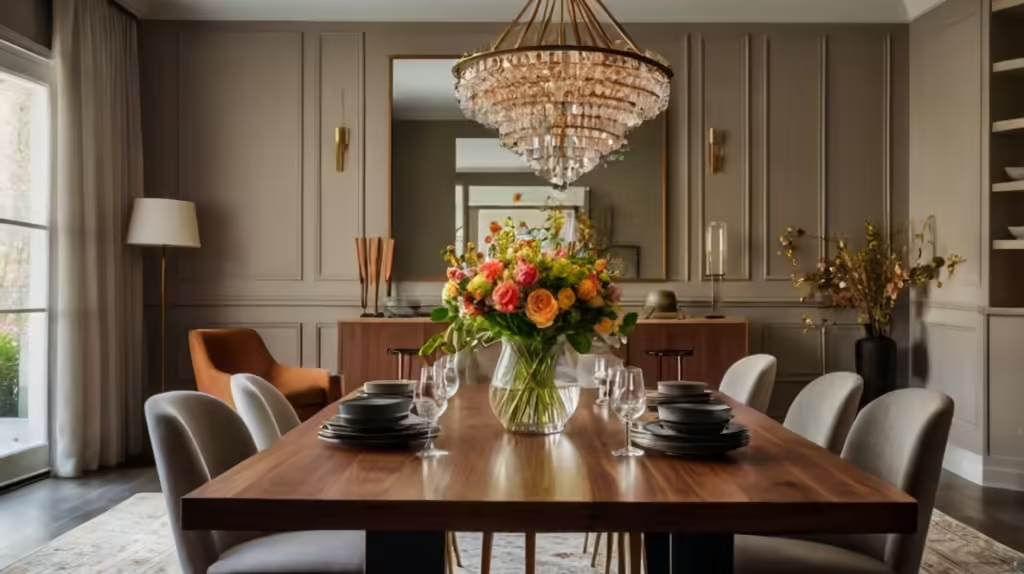The dining room table is the heart of your home, a gathering place for family meals, holiday feasts, and cherished moments. Choosing the right dining room table involves more than selecting a piece of furniture—it’s about finding the perfect blend of style, functionality, and comfort. This comprehensive guide will take you through everything you need to know about dining room table ideas, from styles and materials to layouts and trending designs, ensuring you create a space that’s as beautiful as it is practical.
1. Types of Dining Room Tables
Understanding the different types of dining room tables is crucial for making the right choice. Each type offers unique benefits, suited to various styles, family needs, and space constraints.
Rectangular Dining Tables
Rectangular tables are a timeless choice, offering plenty of seating and a classic aesthetic. These tables are ideal for larger dining rooms and can often include extension leaves, making them perfect for hosting gatherings or accommodating unexpected guests. Their elongated design also makes them great for creating a formal dining experience.
Round Dining Tables
Round tables are perfect for creating an intimate, cozy atmosphere. They encourage conversation by allowing everyone to face one another, making them ideal for family meals or dinner parties. Their compact shape is well-suited for smaller dining spaces, and a pedestal base further enhances legroom and flexibility.
Square Dining Tables
Square tables bring balance to square-shaped dining rooms, providing a harmonious aesthetic. These tables work exceptionally well for smaller gatherings, offering a personal dining experience where everyone feels equally connected. Adding leaves can transform square tables into rectangular ones, offering greater versatility.
Oval Dining Tables
An oval table combines the functionality of a rectangular table with the softer edges of a round one, making it a versatile option for dining spaces of all sizes. They maximize seating capacity while maintaining a sleek appearance, making them ideal for both formal and casual settings.
Extendable Dining Tables
Extendable tables are designed with flexibility in mind, featuring mechanisms that allow the table to expand or contract as needed. This makes them an excellent choice for households that frequently host gatherings but prefer a more compact table for everyday use.
Drop-Leaf and Foldable Tables
Perfect for compact spaces, drop-leaf and foldable tables can be conveniently stored when not in use. These tables are particularly beneficial for apartments, multipurpose rooms, or homes with limited dining areas, offering a practical yet stylish solution.
Pedestal Tables
Pedestal tables eliminate the need for corner legs, enhancing legroom and creating a clean, sophisticated look. These tables are particularly popular for round or oval shapes, providing ample seating without feeling cramped.

2. Materials for Dining Room Tables
The material of your dining table significantly impacts its durability, maintenance, and visual appeal. Here’s an in-depth look at the most popular materials:
Wood Dining Tables
Wooden tables are a classic and versatile choice. Materials like oak, walnut, mahogany, and pine offer distinct grain patterns and finishes that can complement any decor style. Solid wood tables are durable and can last for generations with proper care. Reclaimed wood options also provide an eco-friendly alternative, combining rustic charm with sustainability.
Glass Dining Tables
Glass tables exude modernity and sophistication. They visually expand the space, making them ideal for smaller dining rooms. However, they require frequent cleaning to maintain their pristine look. Tempered glass options offer enhanced durability and safety.
Metal Dining Tables
Metal tables are synonymous with contemporary and industrial styles. Steel or iron bases often support wooden or glass tops, creating a striking visual contrast. These tables are durable and low-maintenance, making them a practical choice for busy households.
Marble Dining Tables
Marble tables bring luxury and elegance to any dining room. Their unique veining patterns make each piece one of a kind. While marble is durable, it requires regular sealing to protect against stains and scratches.
Laminate and Veneer Tables
For those seeking affordability without compromising on style, laminate and veneer tables mimic the appearance of wood or stone. They’re lightweight, budget-friendly, and easy to clean, making them ideal for families with children.
Concrete Dining Tables
Concrete tables are a growing trend, especially in minimalist and industrial interiors. They offer a sturdy, modern look but require proper sealing to prevent damage from spills or scratches. Customizable finishes and shapes add to their appeal.

3. Dining Table Shapes and Seating Arrangements
Selecting the right shape ensures a harmonious balance between functionality and style. Pairing your table with complementary seating elevates the dining experience.
Rectangular Tables with Benches
Benches paired with rectangular tables provide a communal, family-friendly vibe. They’re especially useful for maximizing seating in limited spaces and can be tucked under the table when not in use to save room.
Round Tables with Upholstered Chairs
Upholstered chairs enhance the comfort and elegance of round tables. Consider tufted designs or bold fabrics to add a touch of luxury to the arrangement.
Mix-and-Match Seating
For an eclectic and personalized look, mix different chair styles and colors. Use statement armchairs at the ends of a rectangular table and simpler chairs along the sides for a dynamic visual effect.
Bar-Height Dining Tables
Bar-height tables paired with stools create a casual and contemporary dining environment. These tables work well in open-plan kitchens or loft-style apartments.

4. Dining Room Table Styling Ideas
The way you style your dining table can drastically influence the overall ambiance of your dining room. Here are some creative ideas to consider:
Seasonal Centerpieces
Adapt your table decor to reflect the changing seasons. Use fresh blooms and pastel hues in spring, pumpkins and earthy tones in fall, and glittering garlands and candles during the holiday season.
Layered Linens
Table runners, placemats, and napkins add texture and personality to your table. Experiment with materials like linen, cotton, or burlap to complement your desired aesthetic, whether rustic, modern, or traditional.
Statement Lighting
An eye-catching chandelier or pendant light above the dining table creates a focal point. Pair this with ambient lighting like sconces or candles to enhance the room’s warmth and charm.
Unique Tableware
Elevate everyday dining with artistic tableware. Opt for hand-painted plates, textured glassware, or gold-accented utensils for a touch of elegance.
5. Dining Room Table Placement Tips
The placement of your dining table determines the flow and functionality of your dining room. Here are some essential tips:
Adequate Spacing
Maintain at least 36–48 inches of clearance between the table and surrounding walls or furniture to allow for comfortable movement.
Centering the Table
Position the table under a light fixture to create a visually balanced layout. If natural light is available, place the table near windows to enhance the dining experience.
Functional Proximity
Ensure your dining table is conveniently located near the kitchen for easy serving and cleanup.
6. Dining Room Table Ideas for Small Spaces
Designing for small spaces requires creativity and practicality. Here are some innovative ideas:
Compact Round Tables
A round table with a pedestal base takes up less visual space while maximizing seating capacity. Look for extendable designs for added flexibility.
Convertible Furniture
Consider tables that double as desks or fold away when not in use. Wall-mounted drop-leaf tables are a great solution for ultra-compact areas.
Transparent Materials
Glass or acrylic tables create an illusion of openness, making small dining areas feel larger and airier.

7. Trending Dining Room Table Ideas for 2025
Stay ahead of interior design trends with these innovative dining table concepts:
Eco-Friendly Designs
Tables made from reclaimed wood or bamboo emphasize sustainability without sacrificing style.
Bold Contrasts
Two-tone tables featuring different colors or materials, such as a dark wood top with light-colored legs, make a striking statement.
Integrated Storage
Tables with built-in shelves or drawers offer a practical solution for storing dining essentials.
Customizable Tables
Brands offering modular or bespoke options allow you to tailor the table to your exact preferences in size, finish, and functionality.
Multi-Functional Designs
Convertible tables that shift between dining, work, and entertainment purposes cater to modern, dynamic lifestyles.

FAQs About Dining Room Tables
Q: How do I choose the right dining table size?
A: Measure your dining space carefully and allow 36–48 inches of clearance around the table. For seating, allocate 24 inches per person to ensure comfort.
Q: What’s the best material for a dining table?
A: Solid wood is durable and timeless, while glass offers a sleek, modern look. Consider your lifestyle and maintenance preferences when choosing materials.
Q: Are extendable tables worth it?
A: Yes, they provide flexibility for accommodating guests without permanently taking up extra space.
Q: What shape works best in small dining areas?
A: Round or square tables with compact dimensions are ideal for maximizing space.
Q: How can I protect my dining table?
A: Use coasters, placemats, and tablecloths to prevent scratches and stains. Regular cleaning and maintenance will prolong its lifespan.
Conclusion
Your dining room table is more than a piece of furniture—it’s a centerpiece for gathering, celebrating, and creating memories. By carefully considering types, materials, shapes, and styling ideas, you can design a dining area that perfectly reflects your personality and lifestyle. Whether you’re furnishing a grand dining room or optimizing a small space, these ideas will help you craft a dining experience that is both functional and aesthetically pleasing.

Haris Virk is the creative force and expert content strategist behind ScrapSafari.com. As an accomplished writer and designer, Haris leads the development of innovative content and visually stunning images that captivate audiences. His extensive experience in crafting engaging articles and unique design ideas makes him a pivotal contributor to ScrapSafari’s success.
Haris’s keen eye for aesthetics and trend forecasting ensures that every piece he produces not only informs but also inspires readers. His proficiency extends to mastering Pinterest strategies, where his thoughtfully crafted pins drive significant traffic and amplify the site’s reach.
With a passion for creativity and a deep understanding of content dynamics, Haris Virk brings a distinctive blend of originality and strategic thinking to the ScrapSafari team, solidifying its place as a go-to source for design, ideas, and inspiration.


